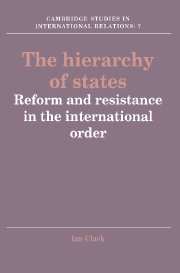Book contents
- Frontmatter
- Contents
- Preface
- Introduction: the ‘whig’ and ‘tory’ interpretations
- PART 1 THE IDEOLOGY OF INTERNATIONAL ORDER
- 1 Order and international relations
- 2 International and world order
- 3 Kant and the tradition of optimism
- 4 Rousseau and the tradition of despair
- PART 2 THE PRACTICE OF INTERNATIONAL ORDER
- Conclusion
- Notes
- Bibliography
- Index
2 - International and world order
Published online by Cambridge University Press: 21 September 2009
- Frontmatter
- Contents
- Preface
- Introduction: the ‘whig’ and ‘tory’ interpretations
- PART 1 THE IDEOLOGY OF INTERNATIONAL ORDER
- 1 Order and international relations
- 2 International and world order
- 3 Kant and the tradition of optimism
- 4 Rousseau and the tradition of despair
- PART 2 THE PRACTICE OF INTERNATIONAL ORDER
- Conclusion
- Notes
- Bibliography
- Index
Summary
PERSPECTIVES ON INTERNATIONAL RELATIONS
Theory, in the field of international relations, is presently in a fragmented condition. If, during the two postwar decades, writers shared certain fundamental analytic perspectives and assumptions, this has become decreasingly so since the 1960s as the menu of theory has become transformed from restricted table d'hôte to unlimited à la carte:
There is no longer a consensus on the subjects of inquiry and theorizing. The view that international theory should be organized around the structures and processes of the states system, the activities of the great powers and their decision-makers, particularly as they relate to war and peace, is no longer accepted by a significant number of scholars.
This fragmentation has occurred at a number of distinct levels. In the first place, it has contributed to lack of agreement about the function of theory itself. In consequence, theory performs a variety of tasks, ranging from the clarification of basic concepts (such as war or power), partial theories (which seek to clarify a particular aspect of the field, such as the causes of war or the nature of crises), grand theories which seek to provide an all-encompassing explanation of the dynamics of the international system (such as balance of power) and, finally, ‘paradigms’ which offer not simply an explanation of how things work but provide a definition of the structures and processes of the very field of international relations itself. As will be demonstrated shortly, it is within this last category that the widest fissures have recently appeared.
- Type
- Chapter
- Information
- The Hierarchy of StatesReform and Resistance in the International Order, pp. 31 - 48Publisher: Cambridge University PressPrint publication year: 1989



